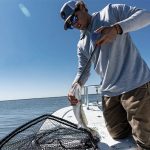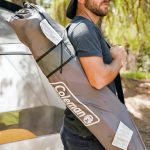Last week, Outdoor Industry Association led a contingent of member company senior executives from W.L. Gore, Columbia Sportswear, VF Outdoor, Cabela's, and Cloudveil Mountain Works for meetings in Washington, D.C. on potential damage to the outdoor industry from quotas on outdoor apparel products sourced in China.
In discussions with the White House, Members of Congress, the National Security Council, Council of Economic Advisors, U.S. Trade Representative, the US State Department and the U.S. Department of Commerce, OIA President Frank Hugelmeyer and company executives explained that a definition used to exempt ski and snowboard pants from import quotas on Chinese manufactured man-made fiber pants was too narrow. With the strict interpretation of that definition by US Customs, many companies will continue to see their ski apparel unduly subject to import restriction. The current definition of ski and snowboard pants was included in a textile and apparel Memorandum of Understanding signed by the United States and China.
“The way the exemption is currently worded, a substantial amount of outdoor apparel product will not qualify” said Peter Bragdon, VP and general counsel for Columbia Sportswear. “This issue affects the entire industry. OIA has taken a great first step in solving this potential crisis for the long term, but there is much more work to be done. We look forward to continuing to work with them.”
OIA has received reports from member companies that as much as 57% of their ski and snowboard pants do not meet the current definition.
In addition, OIA argued, the definition does not extend to similar-make pants that are used for the majority of other outdoor activities, like biking, hiking, fishing, and hunting. Like skiwear, these types of performance outerwear pants are manufactured on specialized machinery using the same highly technical fabrics and, most importantly, domestic production at the volume necessary for retail sale does not exist.
Through its Trade Working Group, OIA developed the revised definition for “performance outerwear pants” and presented it to administration officials last Thursday. OIA also raised the issue of potential safeguard quotas on man-made fiber jackets, a potentially devastating hit to the outdoor industry.
“The agreement with China doesn't put limits on jacket imports, but it doesn't prevent anyone from petitioning for new safeguard quotas either,” warned Hugelmeyer. “Since 50 percent of the industrys total Fall sales are generated by apparel and 75 percent of those sales come from jackets and pants, embargoes could mean billions of dollars in lost revenue and the extinction of some of our smaller manufacturers and retailers. We are confident the administration heard the importance of our message – that the lack of domestic production for performance outerwear jackets and pants is proof that there is no market disruption from imports and that any new petitions would be groundless.”
Last month, Outdoor Industry Association submitted comments to the Committee on the Implementation of Textile Agreements (CITA) requesting petitions for safeguard quotas on man-made fiber jackets be denied based on the lack of domestic production. Shortly after OIA's submission, all pending safeguard petitions were denied. It was the first time any petition was denied by the Committee.
OIA plans follow up meetings to Washington, D.C. in January and will continue to aggressively pursue a long term solution to this problem. Contact Alex Boian at OIA to be added to the trade update email list and watch The B.O.S.S. Report for more stories on this issue.
>>> While this battle seems never-ending, sources at OIA told BOSS that the industry finally made some real headway in their discussions on capital hill
>>> It looks like Cabelas expertise in working with politicians has helped the industry make some headway in this battle…















